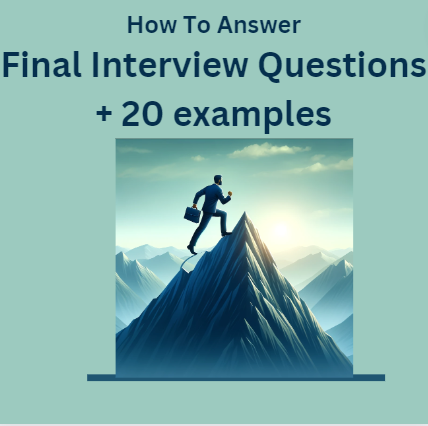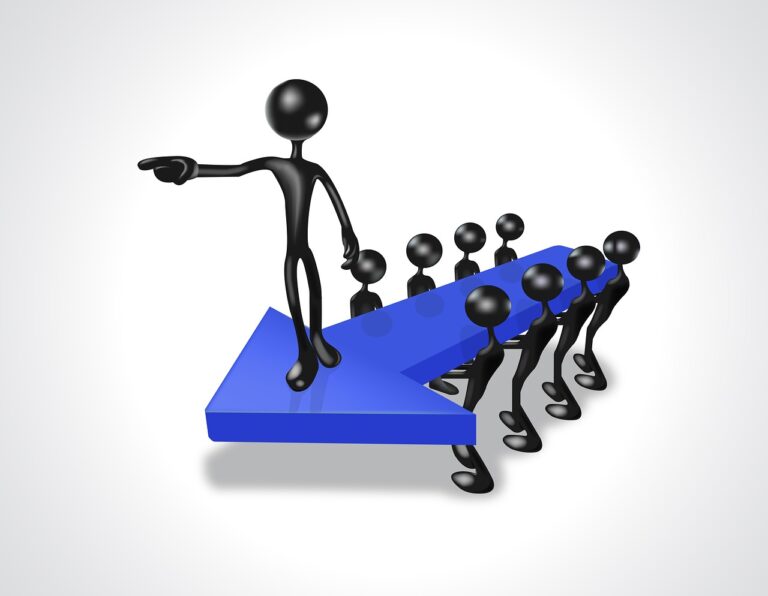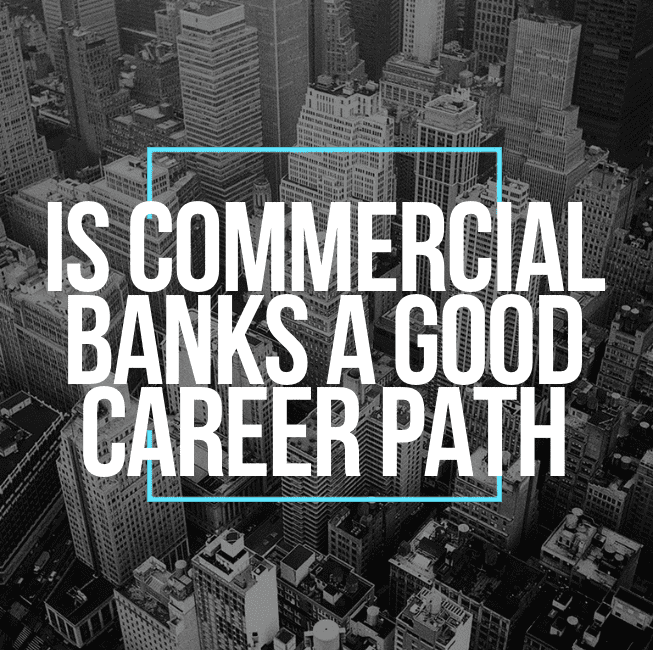How To Answer Final Interview Questions +20 example answers
Final round interviews are the last stage of the interview process, typically conducted after a few interview rounds with HR or the hiring managers. In most cases, the previous interview rounds check your technical fit and other relevant skills, and the final round interview question is focused towards making a final decision on hiring.
The final interviews happen usually for one of the four reasons below

Salary is higher than the range: The salaries you’ve asked for is beyond the range your previous interviewers could approve. Instead of rejecting outright, they have a senior person to review and agree if the company can make exceptions to bring you in. Be prepared to talk about the values/skills you bring in and spend some thinking about salary expectations.
Company practice for all hiring decisions: Some places have a standard practice where someone senior needs to bless every hiring decision before a formal job offer. Stay yourself and you should be fine.
The position is senior level: In some cases your hiring manager might want validation from their peers or managers to get an external perspective. In most of these scenarios, the job requires for you to collaborate beyond the borders of your team.
Multiple good candidates to choose from: It is not uncommon that there are multiple candidates that fit the bill, and a final round is added to pick the best of them. Rarely, it also happens that great candidates create new positions and an authority figure participates in the final stage to validate the idea (& approve additional budgets).
In this blog post, we will provide you with over 20 common final interview questions that will help you ace your interview and stand out from other applicants. We will discuss the importance of general preparation tips, such as researching the company and practicing common interview questions.
Additionally, we will provide specific advice on how to answer each question effectively, including tips on how to stay calm and composed during the interview.
Here are some helpful job interview related blogs
- Tackling the final interview round
- How to answer ‘tell me about yourself’
- What are your career aspirations
- Why do you want this job
- Why should we hire you
- Why are you leaving your job
- What are you passionate about
- Strengths and Weaknesses In Interview
- Interview questions for managers
- What is your management style
- Interview questions for freshers
- Tips to succeed in a job interview
- Types of interview questions
- Interview questions to ask candidates
- Behavioural interview questions
- Walk me through your resume
- What makes you unique
- What are your goals
- How do you handle stress and pressure
- Are you a team player
- How did you hear about this position
- Where do you see yourself in five years
- How do you handle stakeholders
General Preparation Tips for Final Round Interview questions

The final interview is your last chance to impress the hiring manager and secure your dream job. To increase your chances of success, prepare thoroughly for the interview. Here are some general preparation tips to help you prepare for your final interview:
Research the Company
This research can help you understand the company’s culture, values, and mission, which can be useful in framing your answers during the interview. It can also help you gain insights into the company’s work and provide you with an opportunity to ask thoughtful questions.
You can start by visiting the company’s website, reviewing their social media pages, and checking out any recent news articles or press releases. Additionally, you can use LinkedIn or Glassdoor to research the company’s employees, the company’s history, and what it’s like to work there.
Review Your Resume and Cover Letter
Your resume and cover letter got you this far in the hiring process, review them again before your final interview. This can help you remember the details of your work experience and achievements, which can be useful in answering interview questions.
It can also help you identify any gaps in your employment history or areas where you can improve your answers. Also, make sure to review the job description to ensure that you are prepared to speak about how your skills and experience align with the role.
Practice Answering Common Interview Questions
Practicing can help you feel more confident and prepared for your final interview. Start by researching common interview questions for your industry or job type, and then practice answering them out loud. You can also ask a friend or family member to conduct a mock interview with you to get feedback on your answers and practice your communication skills.
Prepare to Negotiate salary
Your final round interview might be with a key decision maker, and would potentially be a decision point about your salary. You may have discussed your salary range in the previous rounds, but this is when you need to be absolutely clear about what is the minimum acceptable offer.
Prepare to say NO
As tempting as it is to be offered a job, you need to be absolutely sure that it is the right fit for you. You are more likely to interact with your senior management stakeholder and might get a real sense of the management culture in the company. Be prepared to walk away politely if you smell something that you do not like (rude, disrespectful behavior etc.,).
Examples: Final interview questions and answers

Here are a few final interview questions that you need to know to help you stand out from the competition and land your dream job.
Note: Please use this set of Questions and sample answers for inspiration only. Hiring managers can smell a copy/paste answer from miles away.
We will cover salary negotiations in a separate post.
“Tell me about yourself”
The final interview usually has a person who has not been involved in the earlier rounds, and might need you to reintroduce yourself. However, you don’t need to be as elaborative as the previous rounds – keep it short (under 2 minutes).
Keep it personal, engaging and talk more about your work history that has a direct relevance with the position you are interviewing for.
Example answers
Business Analyst: “I’m a Business Analyst, passionate about turning data into strategic insights. My journey began in finance, where I developed a keen sense for data trends. Over the last five years, I’ve transitioned to analytics, focusing on enhancing project outcomes through data-driven decisions. At my current role, I led a team in a market analysis project that increased revenue by 15%. I’m attracted to your company’s innovative approach to data and analytics and see a great fit for my skills and passion here.”
Marketing Manager: “I’ve been a Marketing Manager for over a decade, with a focus on digital marketing and brand building. My career started in a small startup, where I learned the ropes of engaging a niche audience. This experience was foundational, leading to my success in larger scale campaigns. Recently, I spearheaded a digital campaign that boosted our online presence significantly. Your company’s creative and dynamic approach to marketing excites me, and I’m looking forward to bringing my experience and fresh ideas to your team.”
“What are your long-term career goals?”
The variations of this question can also be
- Tell me about your Career aspirations?
- Where do you see yourself in 5 years?
- What are you Career goals?
This question is designed to understand your career aspirations and how they align with the company’s long-term goals. To answer this question, be honest about your career goals and aspirations, but also demonstrate how they align with the company’s mission and values.
This question is an opportunity to show that you have a clear vision for your career and that you are committed to growing with the company.
Example responses
Business Analyst: “In five years, I see myself as a Senior Business Analyst, having a more strategic role in project decision-making. I aim to leverage data-driven insights to drive business growth. Your company’s focus on innovative analytics aligns with my goal of evolving into a role where I can impact larger business strategies.”
Marketing Manager: “My long-term goal is to lead a marketing department, shaping brand strategy and driving market growth. The dynamic marketing campaigns your company is known for resonate with my passion for creative and impactful marketing. I’m excited about the possibility of contributing to such influential work.”
“Why do you want to work for this company?”
The alternative questions are
- Why do you want this job
- What do you know about our company’s mission and values
- How do you see yourself fitting into this role and the company culture
- What about this job specifically interests you
The interviewer wants to know why you are interested in working for their company (or this particular job) specifically. They want to hear that you have researched the company/job and that you are genuinely excited about the opportunity.
To answer this question effectively, you should highlight specific aspects of the company that appeal to you, such as its mission, culture, or reputation. You can also mention any connections you have with the company, such as previous experience or a personal connection.
Example answer (for a developer role):
“I’ve been following your company’s journey in revolutionizing cloud computing technologies. What particularly draws me to your organization is the innovative approach to scalable architecture, something I’m deeply passionate about in my professional work. I’m excited about the prospect of contributing to a team that’s at the forefront of developing cutting-edge solutions in the cloud space.
Additionally, your company’s commitment to continuous learning and professional growth aligns perfectly with my career objectives. I see this as a unique opportunity to both contribute and grow in an environment that values innovation and forward-thinking.”
“What motivates you in your work?”
The alternative versions of this question are
- What do you enjoy the most at work
- What are you passionate about
- What work environment do you like to work in
This question is designed to understand what drives you in your career and what keeps you engaged and productive. To answer this question, focus on what you find personally fulfilling about your work, such as solving complex problems, working collaboratively with others, or making a meaningful impact on the world.
You can also discuss how your motivation aligns with the company’s mission and values.
Example answers
Business Analyst: “I am most motivated by the challenge of turning complex data into clear, actionable insights. Collaborating with diverse teams to solve real-world problems energizes me. Seeing how my work directly influences business strategy and growth aligns with my goal to be a catalyst for positive change.”
Marketing Manager: “Creating campaigns that resonate with audiences and drive engagement is what I find most fulfilling. The opportunity to blend creativity with data-driven strategies in a dynamic work environment is what I thrive on. My passion aligns with your company’s commitment to innovative and impactful marketing.”
Developer: “Solving complex technical challenges and seeing my code come to life in products that impact users’ lives is incredibly rewarding for me. I enjoy environments that foster collaboration and continuous learning, which reflects your company’s ethos of innovation and team growth.”
“What are your greatest strengths and weaknesses?”
This question is a classic interview question, but it’s essential to answer it carefully. When discussing your strengths, focus on those that are relevant to the job you are interviewing for. You can use specific examples of times when you demonstrated these strengths in the past.
When discussing your weaknesses, be honest, but also show that you are actively working on improving yourself. Frame your weaknesses as areas for growth and explain what steps you are taking to address them.
Example answers
Project Manager: Strength: “My greatest strength is my ability to manage complex projects. For instance, I recently led a team through a challenging software implementation, maintaining tight deadlines and budget constraints.” Weakness: “I tend to be a perfectionist, which sometimes affects my efficiency. I’m working on this by setting more realistic standards and delegating tasks effectively.”
Graphic Designer: Strength: “Creativity in design is my strongest suit. My portfolio includes several award-winning campaigns that increased client engagement substantially.” Weakness: “Public speaking has always been a challenge for me. I’m improving this skill by attending workshops and volunteering for presentations to build confidence.”
“Why should we hire you?”
Alternate versions for this question
- What sets you apart?
- What can you bring to the company?
To effectively answer “Why should we hire you?” consider the following points:
- Match Your Skills with Job Requirements: Identify key skills the job requires and highlight how your abilities align with these needs.
- Provide Relevant Examples: Share specific achievements or experiences that showcase your ability to succeed in the role.
- Explain Your Unique Qualities: Discuss what sets you apart from other candidates, focusing on your unique strengths.
- Align with Company Culture: Demonstrate how your personal values and motivations are in sync with the company’s culture and goals.
- Show Enthusiasm for the Role: Express genuine interest and eagerness to contribute to the company’s success.
Example responses
- Digital Marketing Specialist: “You should consider me for this role due to my proven track record in enhancing online engagement, which aligns closely with the objectives of this position. My experience in creating targeted marketing campaigns that yielded significant results directly complements your company’s goals. My approach integrates creativity with data analysis, fitting seamlessly with your innovative marketing strategies.”
- Software Developer: “My skills in modern programming and successful experience in leading agile projects make me an ideal fit for this role. I have a history of developing high-performance applications, directly relevant to your company’s focus on developing cutting-edge technology. My passion for coding and dedication to quality align with the objectives and culture of your team.”
“Tell me about a time when you overcame a challenge”
This question is designed to test your problem-solving skills and resilience. To answer this question, choose an example of a challenge you faced in the past and explain how you overcame it. Be specific about the actions you took and the outcomes you achieved.
This question is an opportunity to showcase your ability to think on your feet, adapt to new situations, and persevere in the face of adversity.
Example response
“As a software engineer, I once faced a significant challenge when a critical application began to malfunction right before a major product launch. The pressure was immense, as resolving the issue was crucial for the release. I led an emergency team meeting to brainstorm solutions, and we worked around the clock to identify the root cause.
My proposal to refactor a segment of the code proved effective, and we managed to resolve the issue just in time. This experience taught me the value of calm leadership under pressure and the importance of collaborative problem-solving.”
“How do you handle conflict or difficult situations?”
Conflict resolution is a critical skill in the workplace, and the interviewer wants to know that you can handle challenging situations effectively. To answer this question, provide an example of a time when you successfully resolved a conflict or navigated a difficult situation with your stakeholders. The question can also lead to how you manage stakeholders – read here for a detailed answer.
Emphasize your ability to listen actively, communicate effectively, and work collaboratively to find a solution.
Example response
In my role as a project manager, I once encountered a situation where two key team members had a disagreement over the direction of a project. Recognizing the potential impact on the project’s timeline, I arranged a mediation session where each could express their concerns.
By facilitating open communication and focusing on common goals, we found a compromise that respected both viewpoints. This experience reinforced the importance of active listening and empathetic leadership in resolving conflicts and maintaining team cohesion.
“Can you tell me about a project or accomplishment?”
This question is an opportunity to showcase your achievements and demonstrate your abilities. Choose an accomplishment that highlights your skills and experience relevant to the job you are interviewing for. Make sure to provide context, such as the project’s goals and challenges, and explain your role in achieving success. This is also a very important interview question for managers / project leaders.
Emphasize the results you achieved, such as increased efficiency, cost savings, or improved customer satisfaction.
“Do you have any questions for us?”
This question is an opportunity for you to show your interest in the company and the role. Prepare some thoughtful questions in advance that demonstrate your knowledge of the company and the industry.
You can ask about the company’s goals, culture, growth opportunities, or any recent news or developments. Avoid asking about salary or benefits unless the interviewer brings it up.
Example responses
- For a Project Manager: “Can you share more about how project success is measured here? I’m interested in understanding the key performance indicators that align with the company’s strategic goals.”
- For a Software Engineer: “I read about your recent venture into AI technologies. How does the company envision integrating AI in current projects, and what role would I play in this initiative?”
- For a Marketing Specialist: “What are the primary challenges the marketing team is currently facing, and how does the company plan to address these in the upcoming quarter?”
These questions demonstrate a candidate’s understanding of the role and their interest in the company’s current initiatives and challenges.
Tips for Answering Final Interview Questions
While preparing for the final interview questions is essential, it is equally important to know how to answer them. Here are some tips to help you answer these questions effectively:
Be honest and authentic
One of the crucial aspects of acing the final interview is being authentic and honest. The interviewer wants to know the real you, and if you try to fake it, they will quickly catch on. It is essential to answer the questions truthfully and genuinely, without trying to sound like the perfect candidate. Honesty also helps you build a genuine connection with the interviewer, which is crucial for making a positive impression.
Use specific examples and anecdotes
Using specific examples and anecdotes is a powerful way to demonstrate your skills and experience. When answering the questions, try to provide concrete examples of your achievements, rather than just stating your skills and strengths.
Specific examples can help the interviewer visualize your work and understand how you approach challenges. Using anecdotes can also help you make a connection with the interviewer and make your answers more memorable.
Stay calm and composed
Sometimes the final round can be with very senior levels – managing directors or CEOs or the likes of it. It is natural to feel nervous and anxious. However, it is crucial to stay calm and composed throughout the interview.
They may be at senior levels, but they are still human. Take deep breaths, smile, and maintain eye contact with the interviewer. Avoid fidgeting or nervous gestures, as they can be distracting. Staying calm and composed can help you present yourself as a confident and capable candidate.
Don’t try to impress them, stay yourself as it got you this for. Trust yourself to do it another time!
Practice active listening
Active listening is an essential skill for any job interview. It means listening to the interviewer’s questions carefully and responding thoughtfully. Avoid interrupting or cutting off the interviewer, even if you are eager to answer the question.
Instead, wait for them to finish speaking, and then respond thoughtfully. Active listening can help you understand the interviewer’s needs better and tailor your answers accordingly. It can also help you asking the right questions the opportunity arises.
Wrap Up
In conclusion, answering the final interview questions effectively is crucial for landing your dream job. By being honest and authentic, using specific examples and anecdotes, staying calm and composed, and practicing active listening, you can demonstrate your skills and experience and make a positive impression on the interviewer.
Remember to prepare for the interview, research the company, and review your resume and cover letter before the interview. With the right preparation and mindset, you can ace the final interview and land your dream job.
Here’s some more career related help
- Do you need an Career coach / Interview coach?
- Career as a QA manager
- Project Management
- Managing Managers
- IT Career switch
- Software Engineering career path
Other posts that may interest you
- Careers– Agile Coach, RTE, Product Owner, Scrum Master
- Productivity
- Agility, Agile Testing
- Book summary apps – Headway App vs Blinkist vs getAbstract
About the author: Ilam’s career in Technology and Financial Services spans more than two decades, characterized by leadership roles and vast international experience. He has managed large global teams, worked across five countries, and engaged with colleagues from over 100 nationalities. Through this blog, Ilam shares his diverse experiences and insights, aiming to contribute to and enrich the community.





